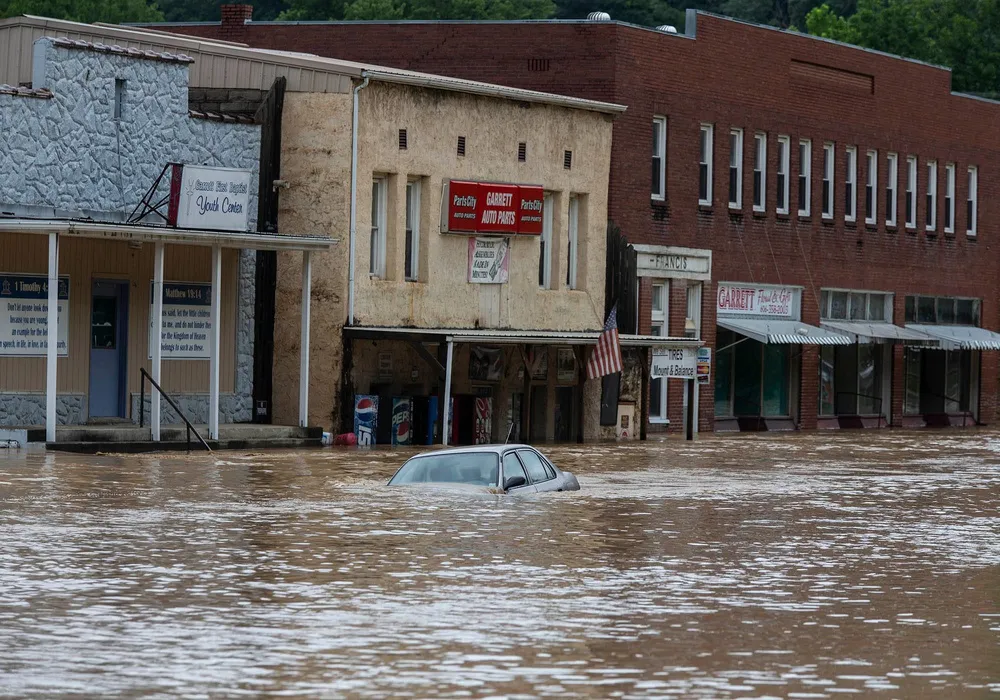For anyone not locked into a climate-denial bubble, it’s pretty apparent that climate change is happening all around us. And in some ways, that “change” has moved to “crisis.”
- Phoenix has just set a new heat record, recording 19 straight days with daily high temperatures over 110 degrees, and nighttime lows over 90 degrees.
- In Florida, the ocean has warmed to the point that it is bleaching out the coral. Since coral provides food for small fish, which are then food for larger fish, this destruction of the coral by a warming ocean could have wide-ranging effects.
- And a study by the nonprofit Climate Central found that extreme weather events in the U.S. — those causing over a billion dollars in damage, in today’s dollars — have increased from every 80 days in the 1980s to every 18 days today.
Here’s the problem: While most people, including government leaders, have a general sense that climate change is well under way, very few are preparing for it. It’s the old saying “Everyone talks about the weather, but no one does anything about it.” And this is especially true in Kentucky, where people often assume that since we are not in the desert or on the coast, we are immune from many of the worst impacts of climate change.
And yes, that much is correct – Kentucky will not see 19 days of temperatures over 110, and the shores of our rivers and lakes are not threatened by rising oceans.
But this misses one of the most important issues: the climate is a system, where a change in one place can cause a different change in another place. And sometimes, those impacts are both wide-ranging and unforeseen.
The Bluegrass State is not immune to the climate crisis. Just as other states have their own set of impacts to consider, Kentucky is facing our own set of problems and questions. But it seems no one is talking about them, much less preparing for them.
Let me lay out, then, some of the issues that Kentucky must address in order to deal with the growing climate crisis. This is just a sampling of the questions we should be asking of our elected leaders and of any candidate who wants to be elected.
Infrastructure
- Can the water infrastructure in each city and county deal with extreme rain events? Where will the water go? Will it be stored, or allowed to run off or flood?
- How much load can our electrical grid handle? If temperatures soar and stay there, can we provide all the electricity needed to run air conditioners?
- If we have a long-term drought, do we have water rationing ordinances in place? Do we have enforcement mechanisms for them, with fines sufficient to discourage scofflaws?
- Speaking of water — what are our agreements with upstream communities on the Ohio? In the case of drought, will Kentucky and neighboring states regulate river withdrawals fairly?
Agriculture
- How will our farmers deal with drought? Or with floods? Do they have water management infrastructure for the floods, and water storage and distribution infrastructure for the droughts?
- It's predicted that western Kentucky will have over 50 days each summer with highs over 90 degrees. How will crops be affected? Are there significant crops that simply can’t be grown here any more? How will we help farmers adapt?
Health
- If our average and peak summer temperatures continue to increase, should we institute summer-time white flag days at various government, non-profit, and even corporate locations, such that persons without air conditioning can get out of the heat on those days?
- Beyond heat-related illnesses, what other health effects could climate change cause? Will mosquito-borne illnesses worsen?
Economy
- If our summer air-conditioning bills continue to increase for all government buildings, how will that affect our government budgets?
- How much more will capital and maintenance projects cost as higher temperatures demand longer breaks and cancelled work days, not unlike the way rain and snow slow productivity, reducing the productivity of crews working outdoors?
- Are there any major companies that are especially vulnerable to climate change, and do we as a state need to do anything to help them? For example, could it become too hot in the summer to work during the day at UPS? If we can’t help all employers to adapt, how will we decide which ones to assist?
Other
- What impact will climate change have on our school schedules, beyond the obvious impacts on physical education and sports programs?
- What effects could climate change have on our tourism industry?
- Kentucky may become a destination state for climate refugees, since it will be seen as having a more moderate climate. If our population increases by 10% or more, are we able to deal with that?
- What could it mean for housing costs?
- Would there be enough jobs?
- Can the local infrastructure handle the population increase?
- If that increase happens in, say, eastern Kentucky, how will those locations handle it?
These are just some of the questions we need to be asking, and the preparations we need to be making. But from just these few bullets, you can begin to see the scope of the crisis facing us, and the need for preparing now.
The politics of the climate crisis
A commentator I follow recently stated flatly, “If a candidate does not have a comprehensive climate crisis plan, they are not worthy of your vote.”
Which leads to my final question: Do either of our two gubernatorial candidates have such a plan? Their campaign sites certainly don’t have.
What can we learn, then, from their actions and statements?
Cameron: Daniel Cameron has “spent his term as attorney general undermining efforts to adapt and ward off further warming in Kentucky and across the country,” according to this analysis by Louisville Public Media.
Beshear: In a statement to Kentuckians for the Commonwealth, Andy Beshear said, “Climate change is real. We need an all-the-above energy policy that includes renewables and any jobs that will create.” But as noted in other reports, Beshear rarely talks about climate change, much less a climate crisis.
Of the two, Beshear is obviously the better choice. But acknowledging that climate change is real, and actually leading the state to prepare for it, are two different things.
This has to change. We can no longer ignore the climate crisis; it is here now, it is growing, and it will affect our communities and our lives in multiple and interrelated ways. We must demand that our elected officials, and our candidates, address questions such as those above, and not just with platitudes.
If we don’t demand those answers, we are guilty of failing as citizens and voters.
And if leaders and candidates can’t provide those answers, they are guilty of serious dereliction of duty.
The crisis is here, Kentucky. We must get ready.
--30--
| Tip Jars |








